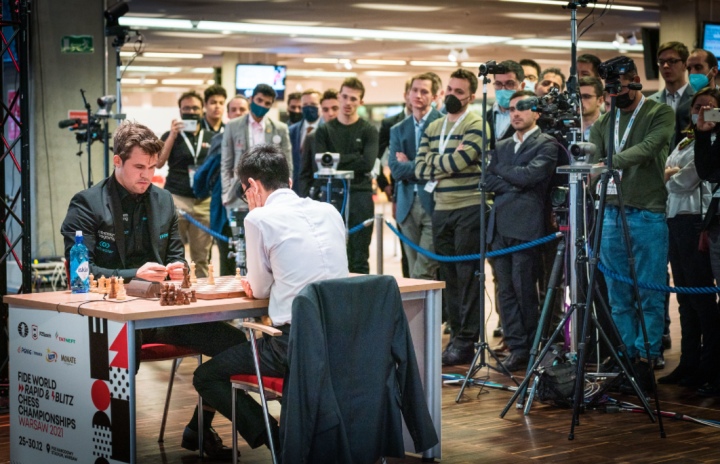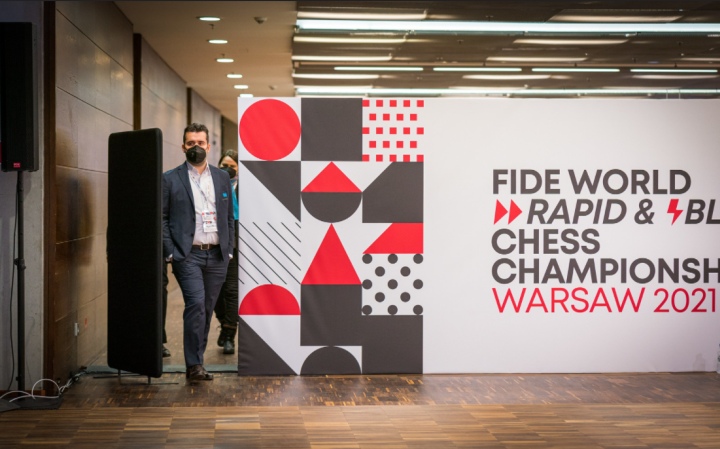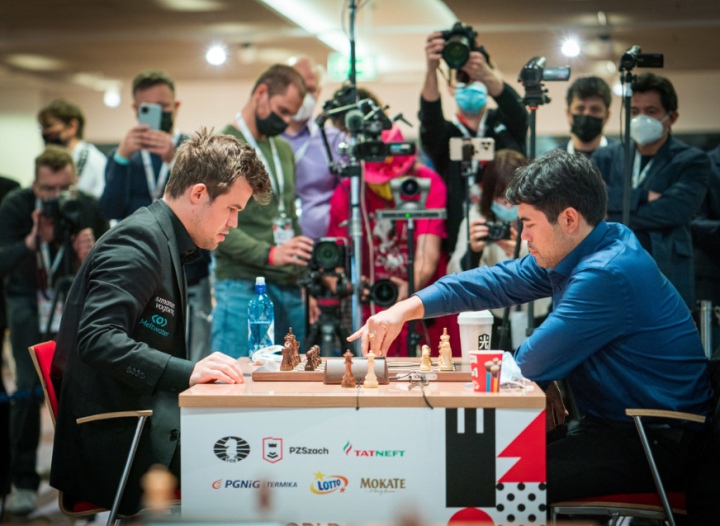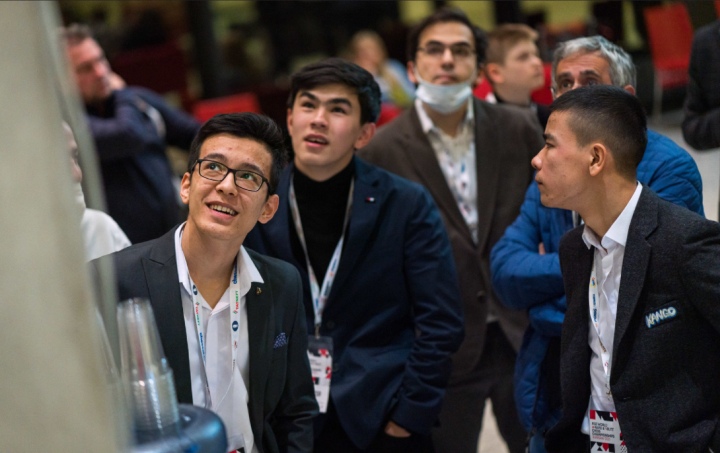Following a blitz tie break victory against Ian Nepomniachtchi, the 17-year-old Uzbek prodigy Nodirbek Abdusatorov won the crown in rapid chess, stripping the defender Magnus Carlsen of his title. In the women’s section, Alexandra Kosteniuk finished first with 9/11 and won her first-ever world crown in rapid chess
With 9.5 points out of 13 rounds, Nodirbek Abdusattorov was the first among four players tied for the top spot in the open section of the World Rapid Chess Championship. The other three were Ian Nepomniachtchi, defending champion Magnus Carlsen and Fabiano Caruana. Under regulations, only the top two players went on to play the tie-breaks.

The champion in rapid chess was decided by two blitz games in which each player had three minutes with a two-second increment per move. The first game was drawn, so the champion was decided in the second game, where Abdusattorov as White scored a victory against Ian Nepomniachtchi. With this victory, Abdusattorov did not only make history but also won a prize of 60,000 USD.
In the women’s section, Alexandra Kosteniuk is the winner of the World Rapid Chess Championship. In eleven rounds of the women’s tournament, Kosteniuk did not lose a single game – scoring seven victories (6 in a row in the first six rounds) and making four draws.
How the final day unfolded in the open section
Day three of the rapid saw the remaining four of 13 rounds played.

There was a big surprise in Round Ten as the defending champion Magnus Carlsen lost to the 17-year-old Uzbek Nodirbek Abdusattorov. Following the English Opening, both sides ended in an equal position, but Carsen, leading black pieces, tried to force a victory. However, things didn’t go his way and – for the first time in the tournament – Carlsen was the one in time trouble. Undeterred, he played aggressively, but Abdusattorov did not let himself be intimidated, finding the right moves and seeking counterplay. The two ended in a queen and pawn endgame where, although Carlsen had an extra pawn, White advanced his pawn down the h-file closer to the promotion. Carlsen could have forced a draw with precise play, but he overlooked a check on the a1-h8 diagonal which forced the exchange of queens, leaving White to promote and win. Carlsen resigned instantly.
This was not the first time Abdusatorrov caused problems for Carlsen. In the 2019 edition of the World Rapid Championship, played in Moscow, the then 15-year-old Uzbek managed to make a comeback in a weaker position against Carlsen and get a draw, which then visibly upset the world champion.
Abdusatorrov’s victory was a big shock which not only turned the tables on Carlsen but changed things at the top of the scoresheet. It was now Abdusattorov and Ian Nepomniachtchi (who in Round Ten beat compatriot Alexander Grischuk) who were in the lead, on 8.5/10, half a point ahead of Carlsen, who was joined by Fabiano Caruana (who scored a confident victory as Black over Bassem Amin to reach the top).

Round 11 saw the first duel between Carlsen and Nepomniachtchi since the two played the match for the title of World Champion earlier in the month in Dubai. Carlsen (White) opted for a sideline in the Catalan, but Nepomniachtchi was unfazed with this surprise. He easily equalised and brought the game to a draw. While Carlsen was struggling to get a lucky break, luck was clearly on the side of Abdusattorov as he managed to save a very bad position with a two-pawn deficit as Black against Fedoseev, keeping him in the lead after the 11th round, together with Nepomniachtchi.
Things changed again in Round 12: luck was again on the youngster’s side. Playing with black pieces, he ended in a hopeless position against the young Indian star Gukesh but managed to wriggle out, although not without some help from his opponent. Meanwhile, Carlsen, won an exchange but his opponent, the seasoned heavyweight Levon Aronian was holding his ground. Suddenly Aronian overlooked a rook exchange, handing over the victory to Carlsen and a place among the tournament leaders. In this round, Nepomniachtchi made a quick draw with Nakamura, saving himself for the final rapid game.
In the final round of the regular part of the tournament, it was an open race: there were four players on nine points (Abdusattorov, Nepomniachtchi, Carlsen and Caruana) and three on 8.5 (Jan-Krzysztof Duda, Hikaru Nakamura and Dommaraju Gukesh). The game between Caruana and Nepomniachtchi ended in a speedy draw, with almost no serious play. The local favourite, Jan-Krzysztof Duda, was close to winning as Black against Abdusattorov, but the Uzbek managed to save a weaker rook endgame and clinch half a point. All eyes were now on the game between Nakamura (who in 2019 won the bronze medal at the world rapid) and Carlsen. Nakamura, playing with white pieces, was caught out in the opening but managed to consolidate. The position transpired into an even rook endgame where Carlsen had an extra pawn. Despite being an expert in grinding opponents in equal positions until they finally make a mistake, Magnus did not manage to convert as Hikaru did not crack and the two finally agreed to a draw.

Thus, the third and final day of the World Rapid Chess Championship – which started with an upset for Carlsen – ended in a drama as there were four players on 9.5 points, in a tie for first place: Nodirbek Abdusattorov, Ian Nepomniachtchi, Magnus Carlsen and Fabiano Caruana. According to the rules, only the first two among them (Abdusattorov and Nepomniachtchi) went to the tie breaks to decide who would be the champion.
The tie-breaks
There was a drawing of lots to determine who would be leading the white pieces in the first blitz game. Nepomniachtchi drew White.
In the first blitz game of the tie break, Nepomniachtchi had come out from the opening with a strong position. Abdusattorov had serious problems in the middlegame but – like in other games during this final day – managed to defend well and get a draw. In the second game, Abdusattorov opted for his favourite set-up in the English opening, got some space advantage and put serious pressure on Nepomniachtchi’s position. Ian had some defensive options, but in the end, he missed a deadly pin along the d-file and a2-g8 diagonal that cost him a pawn. The final portion of the game was played in a mutual time scramble, with Abdusattorov converting his advantage and clinching the victory.

The 17-year-old Uzbek star had a spectacular tournament in which he defeated some of the world’s strongest seasoned players, including Magnus Carlsen. With this remarkable victory, Abdusattorov stripped Magnus Carlsen of the title of world champion in rapid chess and of the prestige of holding all three chess crowns (in classical, rapid and speed chess) at the same time.
Carlsen finished third, thus surrendering the crown of world champion in rapid chess. Former contender for the title of world champion, Fabiano Caruana (who also in this tournament suffered a defeat at the hand of Abdusattorov), ended fourth.
They are followed by seven players on nine points led by the local star Jan-Krzysztof Duda and including Levon Aronian, Hikaru Nakamura, Shakhriyar Mamedyarov, Dommaraju Gukesh, Richard Rapport and Sergey Karjakin.
The 2019 winner of the silver medal, Alireza Firouzja ended the tournament in 20th place, with eight points. Baadur Jobava, who had a very good first part of the event, finished on 7.5/13.

The complete standings can be found here.
Alexandra Kosteniuk becomes Women’s World Champion in rapid chess
With 9/11, Alexandra Kosteniuk has won the Women’s World Rapid Chess Championship. It is the first crown in rapid chess for the seasoned Russian who has previously won almost everything that could be won, including the title of women’s world champion in classical chess.
In eleven rounds of the tournament, Kosteniuk did not lose a single game – scoring seven victories (6 in a row in the first six rounds!) and making four draws.

Although leading during the entire tournament, Kosteniuk had a difficult challenge in the last round as she was Black against top-seeded Kateryna Lagno – who in 2014 won the Women’s World Rapid and has three world championship titles in blitz chess. Had Lagno won the game, the two would be tied for first place and would have gone into the tie breaks. However, in a slightly better position following a four-knights Sicilian, Lagno probably concluded that she doesn’t have serious chances of victory and opted for the safest outcome – a draw, thus handing the crown to Kosteniuk and the first prize of 40,000 USD.
Overall, this has been a great year for Alexandra Kosteniuk, who has also won the first-ever Women’s Chess World Cup and secured a place in the 2022 Women’s Candidates Tournament.
In an interview immediately after her final game, Kosteniuk said that luck played an important role in her victory in the event: “I played some good games, but at some point, luck was needed, and it was on my side”.

The second place (and a prize of 30,000 USD) went to Kazakhstan’s Bibisara Assaubayeva, who in the final round defeated one of the tournament favourites, Nana Dzagnidze. With 8.5/11, Assaubayeva is alone in second place.
Valentina Gunina, who was in the lead with Kosteniuk after the first day, managed to regain her strength after a disappointing performance on day two of the event. In the final three rounds, Gunina made 2.5/3 and finished on eight points. She has shared third place with Kateryna Lagno, who also has 8/11.

Behind them is a score of nine players on 7.5/11, including the previous holder of the women’s rapid crown, Humpy Koneru of India, as well as former world champion in classical chess, Antoaneta Stefanova, and the former holder of the titles of the world and rapid chess champion, Anna Muzychuk. This group includes the 19-year-old rising chess star GM Assel Serikbay, who played some spectacular games against significantly higher rated and more experienced opponents.
Former world champion Mariya Muzychuk and world number two Aleksandra Goryachkina finished the event on seven points, as did the 20-year-old Indian Vaishali Rameshbabu who had a very solid tournament.
The complete standings can be found here.
The event in Warsaw continues with the World Blitz Championship taking place on the 29th and the 30th of December.
Text: Milan Dinic
Photo: Lennart Ootes, Anna Shtourman and Michal Walusza
Official website: worldrapidandblitz.fide.com/
Partners:
















